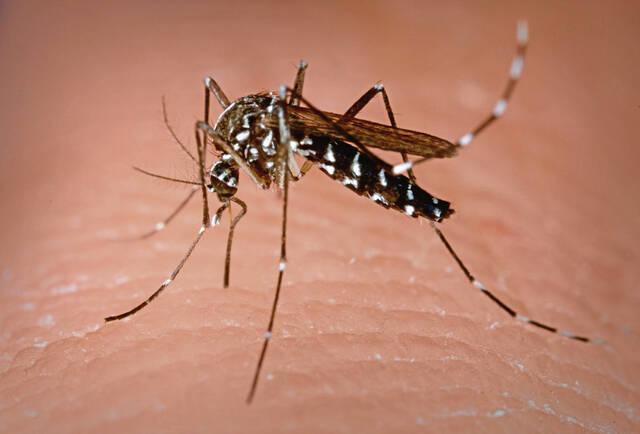https://mirror.triblive.com/local/westmoreland/west-nile-virus-found-in-westmoreland-mosquitoes/
West Nile virus found in Westmoreland mosquitoes

West Nile virus has been detected in Westmoreland County for the first time this year.
Mosquitoes tested positive for the disease after being captured in Latrobe and at the border of Greensburg and Hempfield, according to Chrissy Edwards-McCune, who conducts the county’s West Nile virus monitoring program for the Westmoreland Conservation District.
No cases in humans have been reported this year in the county, she said. The virus can be spread to humans through the bite of an infected mosquito.
Sampling and testing of mosquitoes in the county has been underway since May 6.
At the sites where the infected insects were collected, Edwards-McCune set additional traps for catching mosquitoes and applied measures to control their numbers at the larval stage.
Residents also can help keep mosquitoes under control by eliminating areas outside their homes — such as pools of standing water — that can serve as a breeding ground for the insects, she said.
“Mosquito larvae need water to complete their life cycle, and they only take 5-7 days to become adults,” Edwards-McCune said. “Mosquitoes can breed in just a capful of water.
“You can prevent mosquitoes from breeding around your home by regularly dumping, cleaning and turning over any containers that may collect water, keeping gutters clean of debris and properly disposing of or recycling any unwanted tires.”
Containers of water that can’t be readily emptied can be treated with mosquito dunks or bits, found at home improvement stores, she said.
To avoid mosquito bites, she advises using approved repellent and wearing long sleeves and pants when outside, especially around dusk and dawn.
Eight out of 10 people who are infected with West Nile virus don’t develop symptoms, the Centers for Disease Control and Prevention says. About 1 in 150 people who are infected may develop a severe illness affecting the central nervous system, such as encephalitis or meningitis.
Copyright ©2026— Trib Total Media, LLC (TribLIVE.com)
